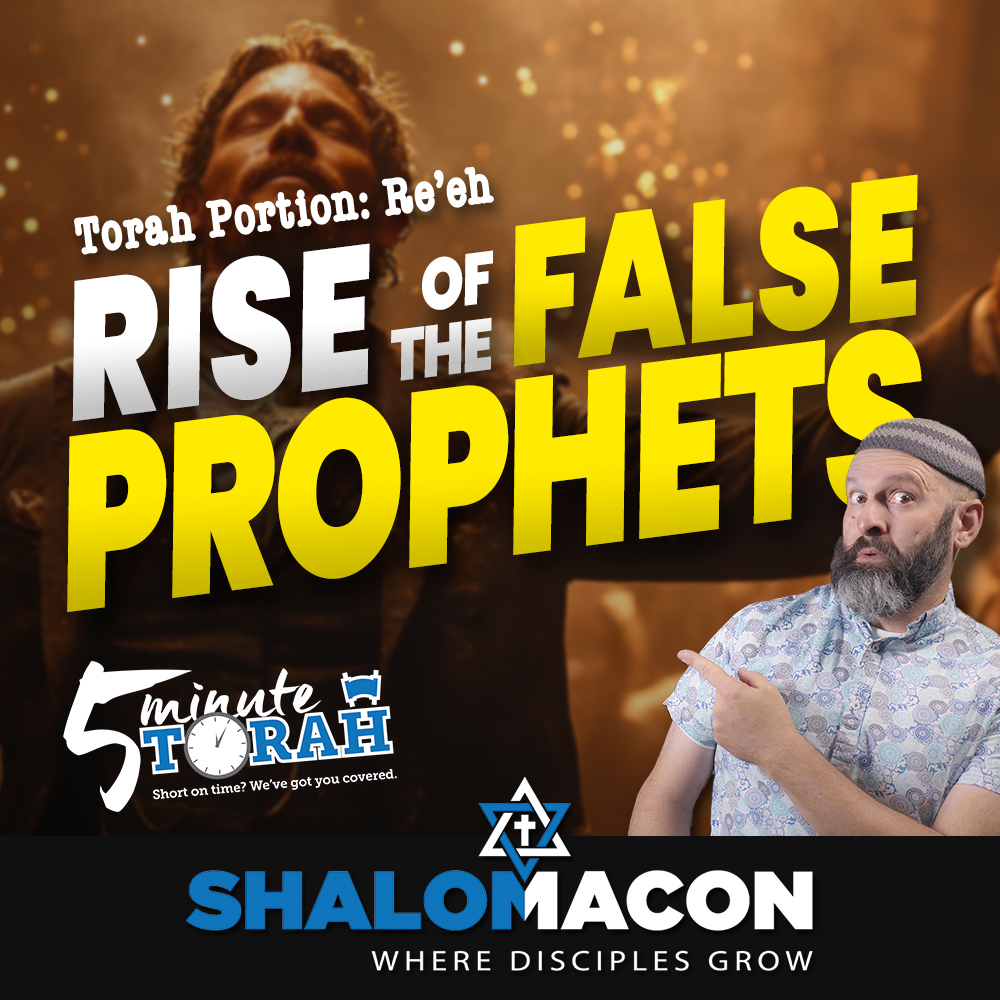[00:00:00] Speaker A: Right now, Israel is fighting a war for their right to exist. The entire world wants to see them wiped from the face of the planet. All they want is peace. They've tried begging, bargaining, and even giving away their land and security for at least the hope of peace. But even through all of this, their enemies won't stop until they have killed every last jew. So to obtain peace, Israel literally has to fight for it. But can violence ever bring about peace? Isn't violence the opposite of peace? Maybe. But maybe not. Let's explore this idea together in this week's five minute Torah.
Welcome back, Shalomis. It's great to be back with you here for another episode of five minute Torah. This week we're studying the Torah portion of Pinchas, numbers 25, ten through 30, verse one, if you're in a jewish publicized bible, or through chapter 29, verse 40, in a Christian publicized bible, and here are the three things that you need to know about it. Number one, defending God. The reward of Pinchas. Last week's Torah portion ended with the account of Pinchas, the grandson of Aaron, who took decisive action to stop the Israelites from engaging in idolatry and immorality with the Midianites. Pinchas killed an israelite man and a midianite woman as they were engaged in sexual immorality at the entrance of the tenement meeting. His action put an end to the plague that had afflicted the israelite camp. This week's portion opens with God rewarding Pinchas for his zeal to defend God's honor. Number two, the laws of inheritance. Zelophad's daughters. The portion also addresses a legal matter concerning inheritance rights. The daughters of Zlofchad, a man from the tribe of Manasseh, approached Moses and the leaders to request that they be granted their father's inheritance. Since he had no sons. God confirms their right to inherit their father's portion and establishes a broader principle of inheritance for those without male heirs. This section of our portion highlights the Torah's value of women in matters of inheritance and property rights, especially in a time when the rights of women were unimaginable in other societies and number three, the laws of offerings and their liturgical connection. The last part of our Torah portion contains detailed instructions regarding the laws of specific time related offerings and sacrifices. Sacrifices. These laws outline the various types of offerings, the occasions on which they are to be presented, and the procedures for how they are to be offered. They include the daily offerings, the additional offerings made on the Sabbath, the special offerings made at the beginning of each lunar month and additional offerings that were to be made on each festival. Today, the passage for each of these offerings is read at the corresponding event. The passage for the daily offerings are part of the daily liturgy. The offerings for the Sabbath are part of the Sabbath liturgy, etcetera. Because of this, this section of scripture is one of the most frequently read passages in the entire Torah. If you're looking for a place to learn, connect, and grow, then Shalom Macon is the place. It doesn't matter where you are in the world. You can find a connection with Shalom Macon through our live services every Saturday and through our private social network we call Shalom at home. Check us out on YouTube and on our
[email protected], for more information. We look forward to connecting with you and seeing you this Shabbat this week's Torah commentary is called the High Price a piece and comes from my book five minute Torah, volume two. In last week's Torah portion, we learned about the prophet Balaam and how he was not able to curse Israel in a direct manner. Every time he opened his mouth to curse Israel, it would be filled with blessings instead. Nevertheless, at the end of last week's Torah portion, we learned that Moab was somehow able to have a destructive impact on the children of Israel. While Israel lived in Shittim, the people began to whore with the daughters of Moab. These invited the people to the sacrifices of their gods, and the people ate and bowed down to their gods. So Israel yoked himself to baal peor, and the anger of the Lord was kindled against Israel. Numbers 25, one through three. The result was devastating. Thousands of Israelites died in a plague because of their infidelity to the one who had brought them out of Egypt. Fortunately, this plague was brought to an end, but only through the seemingly vigilante style execution of an israelite and his moabite escort. At the entrance of the tenem meeting, Pinchas, otherwise known as Phineas, the son of Eleazar the Koanhe, took a spear and ran it through both the israelite and his lover. After this act, the Torah tells us thus the plague on the people of Israel was stopped. Nevertheless, those who died by the plague were 24,000. This is chapter 25, verses eight and nine. Many people have questioned this act of Pinchas throughout the centuries. Was this act a vigilante one? And could the plague have been stopped through another means? This question becomes even more pronounced when we look at the following verses. And the Lord said to Moses, Phinehas, the son of Eliezer, the son of Aaron the priest has turned back my wrath from the people of Israel, and that he was jealous with my jealousy among them, so that I did not consume the people of Israel in my jealousy. Therefore say, behold, I give to him my covenant of peace, and it shall be to him and to his descendants after him the covenant of a perpetual priesthood, because he was jealous for his God and made atonement for the people of Israel. This is numbers 25 1013. Although a surface reading of this passage seems to indicate that this action was indeed sanctioned by the holy one of Israel, there's something going on behind the scenes. In the Hebrew, verse twelve says, behold, I give to him my covenant of peace. In the Hebrew, the word for peace is shalom. It is written with four hebrew letters. Sheen lamed vav mem. In this case, however, one of the letters is written in an unusual manner. In this passage, the word shalom is written defectively with a broken vav. In a standard Torah scroll, the letter vav is cut in half. From this anomaly, many have speculated that the covenant of peace that the Lord made with Pinchas was not necessarily a perfect or complete one, but one given more as a consolation prize. According to this theory, the Lord did not completely approve of the vigilante aggression of Pinchas. But does this theory hold water? First, if we read the account of Pinchas in last week's portion, his act is initiated by the command of Moses. In the verse just before his story is told, Moses told the leaders of Israel, each of you kill those of his men who have yoked themselves to baal peor. Numbers 25 five. Therefore, Pinchas was merely following the instructions of the Lord given through the mouth of Moses. Second, the scriptures memorialized the act of Pinchas as one of righteousness. The psalms tell us, then Pinchas stood up and intervened, and the plague was stayed, and that was accounted to him as righteousness from generation to generation forever. Psalm 106, verses 30 and 31. If this is the case, then what does the broken vav tell us? What does it symbolize? If we think about the numeric and symbolic meaning of the letter vav, then we can make another connection. The letter vav has the numerical value of six. Since man was created on the 6th day of creation, the letter vav has come to represent mankind. While we can only speculate, it's likely that the broken Vav reminds us that this covenant of peace that was given to Pinchas and his descendants came at a very high cost. It came at the cost of human life. Humanity was diminished or broken in order to bring about peace. The next time we are enjoying a moment of peace. Let's not forget the price that was paid to achieve that peace. Not only did our forefathers fight wars and give their own blood so that we might have peace today, but our righteous messiah was broken on our behalf so that we might have peace as well. The vaV will always remain broken so that our peace may be made whole. If you havent already, I want to encourage you to check out our new teaching series called repaving the Romans Road. Its a study on the book of Romans from a messianic jewish perspective. Misunderstandings over this one book have caused so much theological confusion and anti semitic ideology over the last 2000 years, it cannot be understated. If you want to understand the Book of Romans from a perspective that's much closer to what Paul had in mind when he wrote it, you can check it out using the link above or at the end of this video. I'll see you next week for another messianic insight into the eternal Torah of God. Blessings from Shalom Aiken, the place where disciples of Yeshua learn, connect, and grow.
[00:09:03] Speaker B: Please visit our website shalommakin.org to learn more about us. Join our live services, access other teachings, sign up for our newsletter, join our private network that will connect you with our greater community from around the world, or contribute to the work of Shalom Macon. Thank you for watching and we look forward to connecting with.



